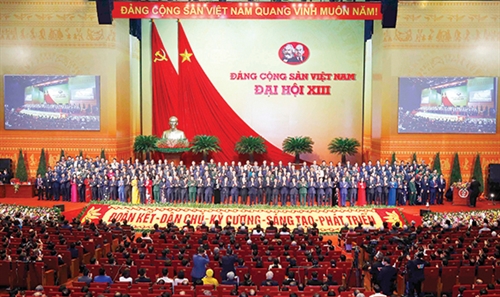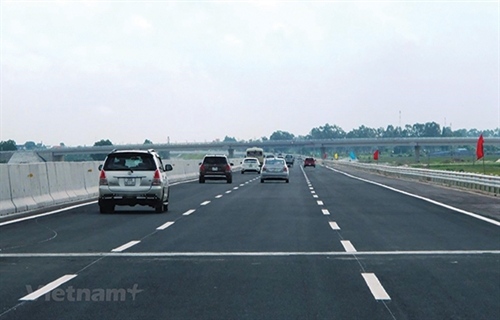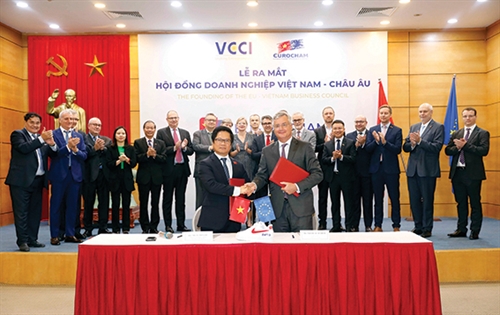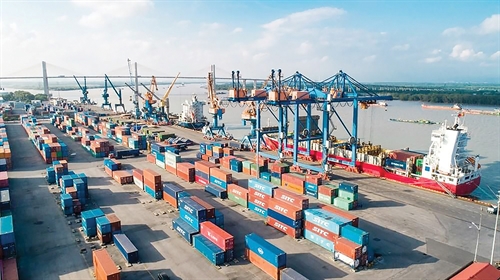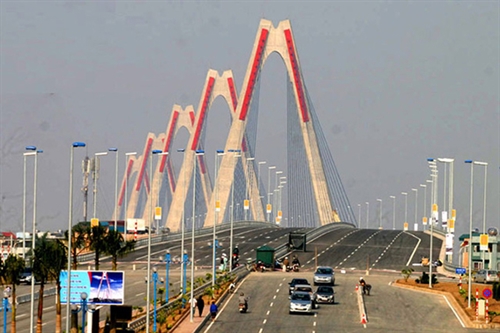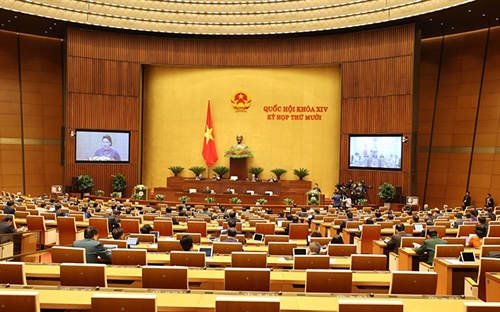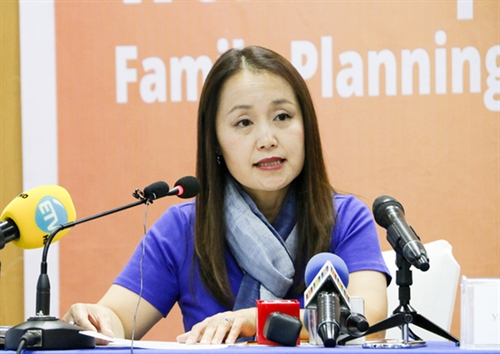Right on the first day of the year, the Government adopted two resolutions, coded 01/NQ-CP and 02/NQ-CP, on major tasks and solutions for implementation of the 2021 socio-economic development plan and improvement of the business environment and national competitiveness. This aims at the target that the country will record more achievements and progresses than 2020 as instructed by the Party Chief and President Nguyen Phu Trong at the Conference between the Government and local administrations last December.
Striving for GDP growth rate of 6.5 percent
As evaluated by the Government, last year the country successfully fulfilled the “dual goal” of fighting the COVID-19 pandemic and ensuring economic restoration and development. With the economic growth rate of 2.91 percent recorded last year, Vietnam appeared to be among just a few economies achieving a positive growth rate in the world and the region while maintaining macroeconomic stability, controlling inflation and ensuring major balances of the economy.
According to Minister-Chairman of the Government Office Mai Tien Dung, with Resolution 01, the Government delivers messages of the new year of further innovating the development thinking, taking more resolute and effective actions, resolving to overcome all difficulties and turn challenges into opportunities, and taking advantage of achievements of Industry 4.0 and the trend of shifting investment, trade and digital transformation in the region and the world.
The resolution shows the cabinet’s determination to fulfill 12 major targets set by the National Assembly in Resolution 124/2020/QH14(*) as a prerequisite for accelerating the growth right from the opening year of the 2021-25 period, orienting to fast and sustainable development according to the relevant resolutions of the Party and the Legislature.
Based on evaluations by international organizations and with a great resolve, the Government sets a GDP growth rate of around 6.5 percent for the year 2021, higher than that of 6 percent assigned by the National Assembly.
To achieve the above targets, the cabinet identifies 11 groups of major tasks and solutions for ministries, sectors and localities to perform.
(i) Effectively serving the organization of the 13th National Party Congress and election of deputies to the National Assembly and local People’s Councils; preparing and expeditiously realizing action programs for implementation of the resolutions of the Party and the National Assembly;
(ii) Further implementing in a flexible and effective manner the “dual goal” of fighting the COVID-19 pandemic and ensuring socio-economic restoration and development in the new normal;
(iii) Continuing to improve socialist-oriented market economy institutions to facilitate economic restoration and boost fast and sustainable growth based on maintained macroeconomic stability, curbed inflation and guaranteed major balances of the economy; and raising the adaptability and resilience of the economy;
(iv) Stepping up economic restructuring in association with changing the growth model and raising the productivity, quality, effectiveness, autonomy and competitiveness of the economy based on the platforms of science and technology and innovation;
(v) Increasing the mobilization and effective utilization of resources; speeding up the formulation and approval of master plans and implementation of key socio-economic infrastructure projects; boosting the development of marine economy; improving regional interconnectivity; promoting the role of key economic regions and large urban centers; and intensifying the building of a new-style countryside;
(vi) Raising the quality of, and effectively employing, human resources in tandem with stepping up innovation and application of science and technology;
(vii) Promoting cultural and social development and realizing social progress and justice in harmony with economic development;
(viii) Managing, effectively and sustainably exploiting and using natural resources and protecting the environment; proactively and effectively responding to climate change; and enhancing disaster prevention, control and mitigation;
(ix) Stepping up administrative reform and raising the effectiveness and efficiency of the state management work and quality of the contingent of cadres, civil servants and public employees; building a facilitating, developed and incorruptible state administrative system serving the people with resolute actions; and exerting greater efforts in anti-corruption, thrift practice, waste combat and complaint and denunciation settlement;
(x) Consolidating national defense and security, maintaining political security and social order and safety, raising the efficiency of external activities and international integration, and keeping an environment of peace and stability for national development; and,
(xi) Stepping up information and communications and building confidence and social consensus; increasing the efficiency of people agitation work, properly exercising democracy at the grassroots and increasing coordination with the Vietnam Fatherland Front, socio-political organizations and mass organizations.
With Resolution 01, the Government asks ministers, heads of ministerial-level agencies and government-attached agencies and chairpersons of provincial-level People’s Committees to enact before January 20 their own programs or plans of action for implementation of the resolution. These agencies are also assigned to perform the tasks and solutions drawn in the resolution in a swift, effective, substantial and comprehensive manner to create marked changes right from the beginning of the year. They must take the initiative in making analyses, evaluations and forecasts for working out timely, overall and synchronous solutions, while making the best use of opportunities and advantages and mitigating adverse impacts to boost the development of all sectors and localities.
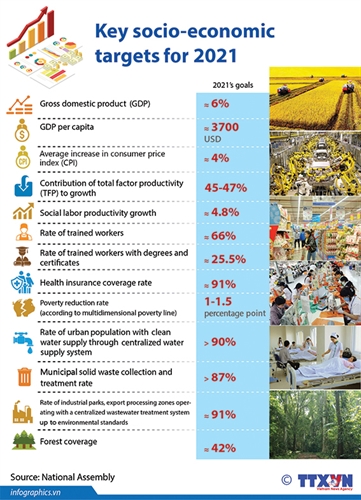 |
Improving business climate and national competitiveness to prevent the country from being left behind
Resolution 02 sends the Government’s message of regarding the improvement of the business environment and national competitiveness as a central and regular task, Minister Dung said, explaining that staying still or making slower reforms means that the country will be left behind.
The resolution requires further efforts for the achievement of the specific targets set forth in Resolution 68 issued last May that aimed to cut or simplify at least 20 percent of the number of regulations and 20 percent of compliance costs of regulations concerning business operations for the 2020-25 period.
Resolution 02 draws up four groups of general tasks and solutions for ministries, sectors and provincial-level People’s Committees. The first group sets out orientations and requirements on remediation of limitations and problems in the coordination among related agencies and units. The second one focuses on directing the performance of tasks and solutions with regard to digital transformation under Prime Minister Decision 749/QD-TTg dated June 3, 2020, approving the Program on national digital transformation through 2025, with orientations toward 2030 (Decision 749), in combination with administrative reform. The third group emphasizes the formulation and implementation of medium- and long-term strategies and plans with clear objectives and specific roadmaps to create improvements that are hard to be made in a short term. Finally, the fourth group provides solutions to further help the people and businesses restore their production and business activities and overcome adverse impacts of the COVID-19 pandemic.
The resolution also aims at attaining the overall and specific objectives for 2021 in Resolution 02 of 2019 of the same kind. To this end, the Government requires ministries, sectors and provincial-level People’s Committees to organize the implementation of the following tasks and solutions:
Firstly, to fully, consistently and effectively implement the tasks and solutions for attainment of the objectives and targets identified in Resolutions 02 of 2019 and 2020, focusing on such issues as construction licensing, property registration, settlement of contractual disputes, settlement of corporate bankruptcy, quality of land administration, application of information technology, quality of vocational training and student skills, patent registration, corruption control, extent of involvement in online transactions, job opportunities in knowledge-intensive industries, and sustainable eco-environment.
Secondly, to immediately remove limitations and problems in the coordination among agencies and units through identifying focal points and clearly defining the rights and responsibilities of focal points and coordinating bodies. At the same time, to solve problems caused by unspecific, overlapping or contradictory regulations on the state management of investment, land, construction, and natural resources and environment. In addition, to consolidate legal documents to ensure the consistency, synchrony, transparency, understandability and accessibility of the legal system.
Thirdly, to perform digital transformation tasks and solutions under Decision 749 in tandem with administrative reform, focusing on solutions to increase the adaptability to the new-style production in the era of Industry 4.0. Specific tasks and solutions include (i) providing online public services of levels 3 and 4, proceeding to the online provision of all essential public services for the people (e.g., healthcare, education and training, and social security services); (ii) promoting cashless payment and e-commerce development; (iii) applying information technology to make relevant procedures more transparent, mobilize the participation and contribution of businesses and people in building administrations, and connecting and sharing data to serve state management work; and (iv) formulating and implementing the Program on support for businesses in digital transformation in the 2021-25 period.
Fourthly, to formulate and implement medium- and long-term strategies and plans with specific objectives and roadmaps so as to create substantial changes that are hard to be made in a short term, e.g., environmental protection, multidimensional poverty reduction, and development of mountainous, deep-lying and remote areas, etc. Furthermore, to maintain and improve the country’s sustainable growth ranking and, at the same time, carry out communications for raising the public awareness, especially awareness of the business community, about contents and importance of sustainable development.
Fifthly, to continue helping the people and enterprises restore production and business operations and remediate the adverse impacts of the COVID-19 pandemic.
Of the above, digital transformation and support for remediation of the consequences of the COVID-19 pandemic receive great attention from the public.
According to the Ministry of Planning and Investment, national digital transformation will be conducted not only within agencies of the State and the Government but also on a wide scale, especially for businesses in the process of their restructuring in combination with digital transformation and digital technology. This is an objective and really urgent requirement and also a prerequisite and leverage for Vietnam to achieve the growth target in the time to come.
Delay in digital transformation would make the country’s economy in general and enterprises in particular be left behind as compared to other countries in the world. Therefore, the MPI proposes to the Government the Program on support for enterprises, especially small- and medium-sized ones, in realizing digital transformation and restructuring themselves right from 2021, the first year of the next five-year period, as a measure to help Vietnamese businesses catch up the world’s trend of digital transformation. Digital transformation also serves as a condition for domestic enterprises to coordinate with one another in creating the combined strength and become larger and stronger, thus contributing to social development.
Deputy Minister of Planning and Investment Tran Quoc Phuong said, as assigned by the Government leader, his ministry would act as the focal point and coordinate with related agencies in formulating a plan on provision of the second package of financial aid for remediation of the adverse impacts of the COVID-19 pandemic and send a report thereon to the Government and Prime Minister. The final objective is to work out in 2021 the optimal solutions for the economy in general and for enterprises and entities affected by the pandemic in particular.- (VLLF)
